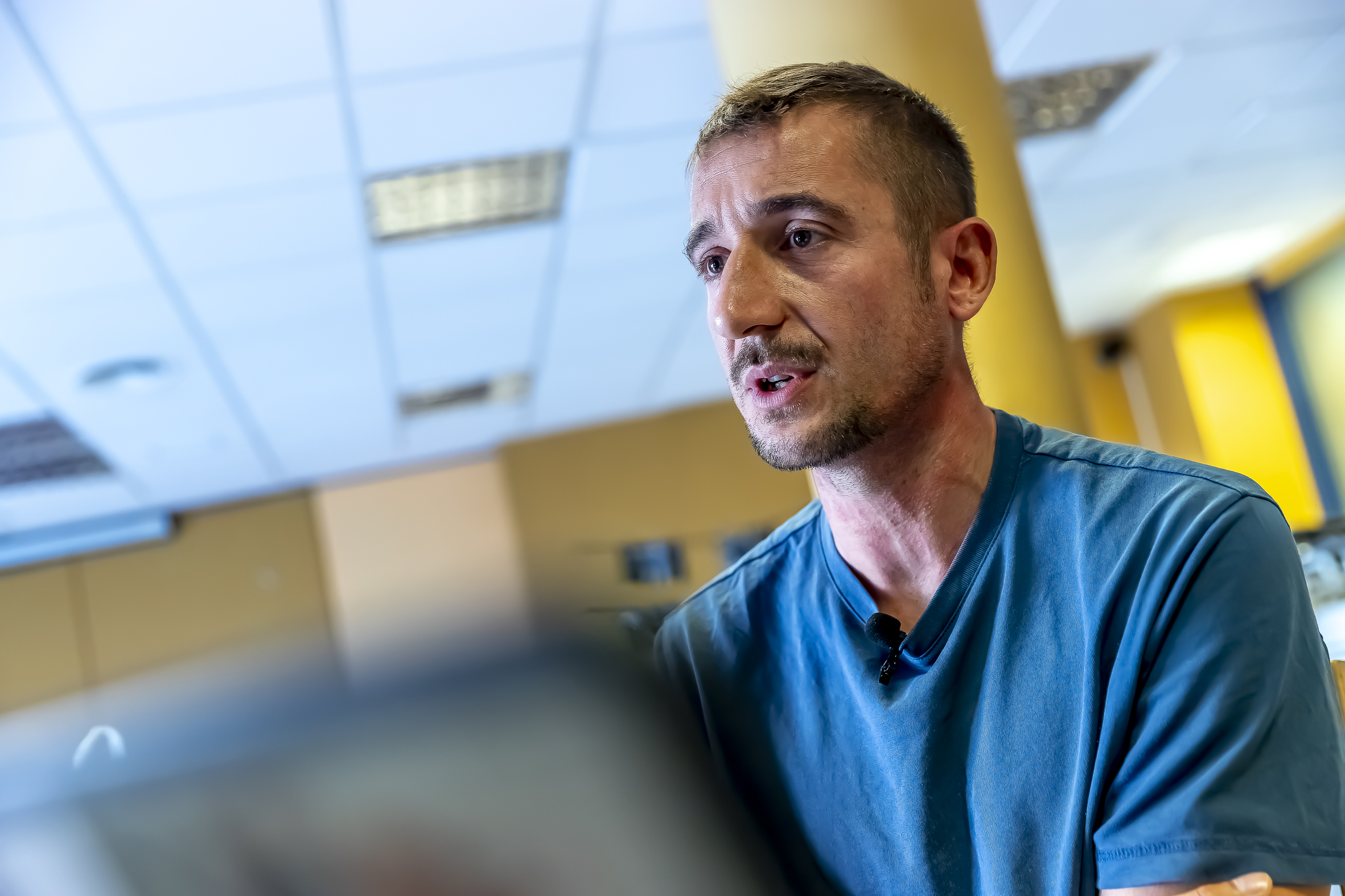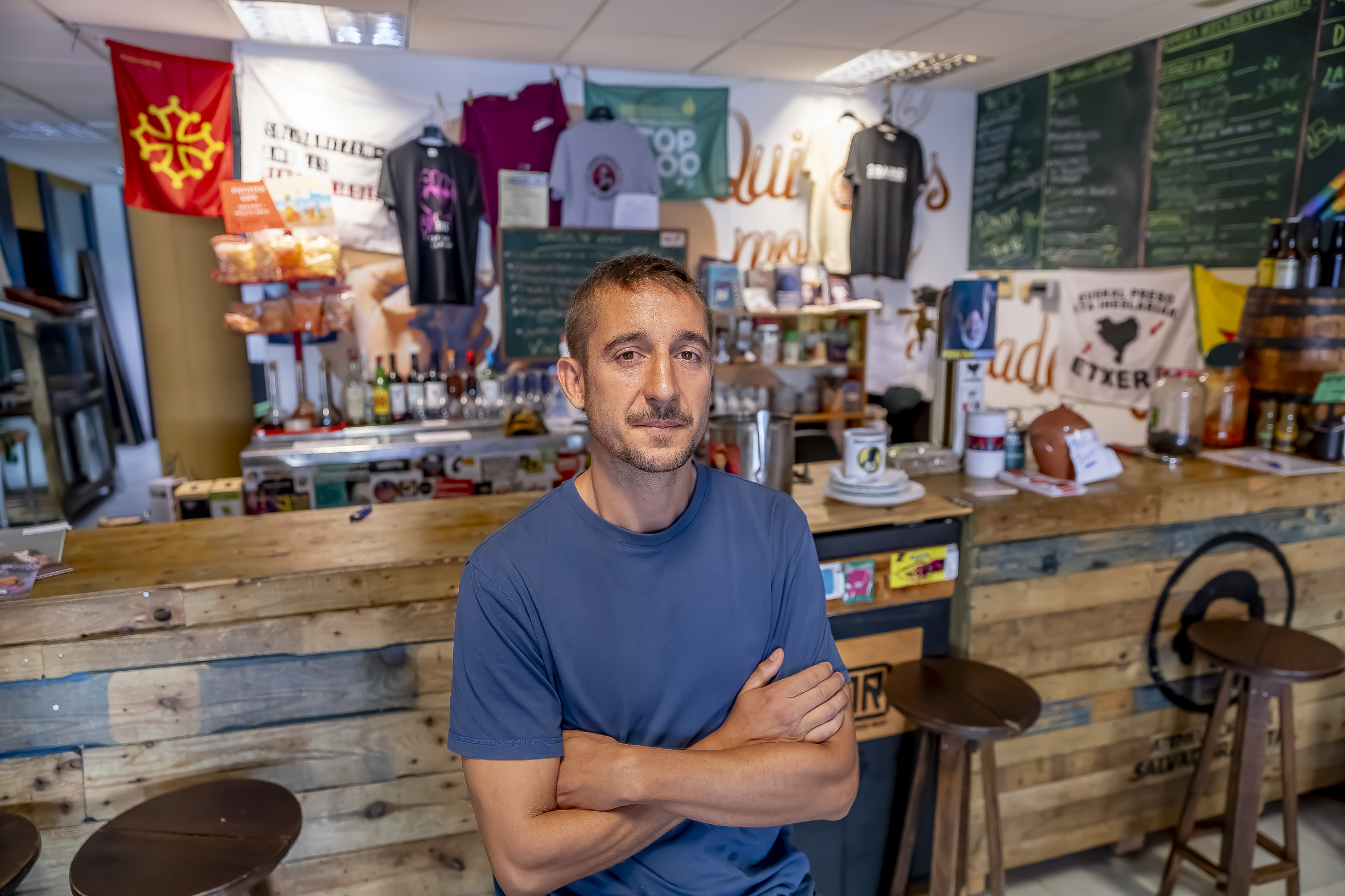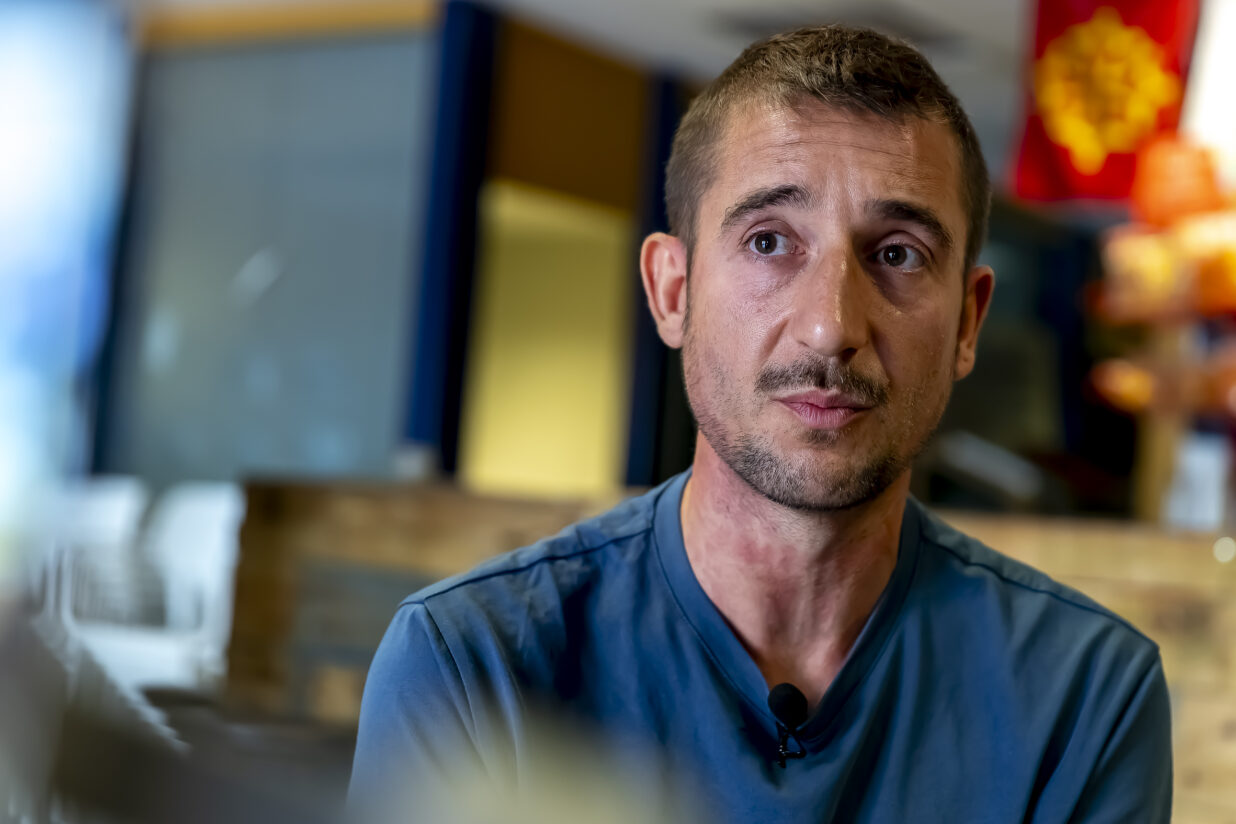18.01.2024 - 17:41
|
Actualització: 26.03.2024 - 02:51
[This article was originally published in Catalan on 26 July 2023.]
Òscar Campos is currently going through the process of turning a psychologically challenging experience into a political and anti-repressive struggle. He has been the victim of the latest known case of infiltration by a Spanish police agent into the pro-independence left parties. Maria was his partner for three years, living together and gaining the trust of his friends, family, and fellow activists. As revealed by La Directa, this young woman from Mallorca was actually working as an infiltrator in independentist and social movements in Girona, with her mother helping to make her double life more believable.
It’s a story that seems like fiction but is very real, and it’s yet another example of espionage tactics that, despite being legal only in cases involving armed groups or similar situations, the Spanish state employs with impunity against peaceful social movements. We talk to Campos about his case, how he experienced it, and especially how he believes the independence movement should react to these methods.
—About three weeks ago, you discovered that your partner was an undercover agent of the Spanish police. First of all, how are you now?
—The wound will last a long time, but we are fortunate to have great support. We are in the hands of psychologists who treat it as a trauma episode. It’s a roller coaster that both I and my environment suffer: sadness, pain, anger, longing… And it’s so serious that there are moments when you doubt it’s true and that you’re not the protagonist of a nightmare or a spy movie. But you come back to reality and see that you’re facing a state governed by the PSOE that has starred in this movie. It’s gratifying to see that there is a great journalistic team that has exposed these moles. They unmasked her, and now everyone knows she’s a police officer and her lack of scruples.
—How did she enter your life, and what strategy did she follow?
—When she arrived, she already had information about the political force in Girona and the people in certain spaces. We have always been visible faces of the independentist and social movement, and she comes with a programmed strategy on what to do and whom to approach. She arrived in May 2020. In a training academy to enter university, she met someone very close to my sister and me, she joined the anti-racist movement and participated in activities related to this struggle. We established a relationship that soon became daily, we lived together for almost three years.
—In which specific groups did she enter to extract information?
—In anti-racist spaces, in the housing union, in the feminist coordination of March 8, and also in spaces like the popular gym of Pla de l’Estany. Both Maria and I have been part, almost from the beginning, of the union and the creation of new structures where she had a role, not very important, but as a presence in daily work, managing the sale of T-shirts and other income.
—Was she seen as just another person in the movement?
—She wasn’t just another person; she was special. Anyone who has met Maria has a fond memory of her. The Machiavellian strategy was to generate an approach to me and my environment so that we could never suspect. How could I suspect the person who had become the most important in my life? How could I suspect someone who said her father had cancer and needed emotional support? How could we suspect someone who introduced me to her real mother, with whom I established a phone relationship? I also met her and stayed at her house when I was in Mallorca… Even Maria introduced me to one of her best friends, another one who invited us to her restaurant, and we were even invited to another friend’s wedding.
—Could her friends also be involved?
—In the case of her mother, yes, because she has a fundamental role: to make me feel special because Maria has me in Girona. More than if these friends are involved, the question is that she involved them to establish a perfect alibi. She established a very emotional strategy that worked, generating this affection from me towards her in a very high way. She was a fundamental pillar of my life; we had plans for the future… She has crossed limits because she has delved into the most intimate questions.
—She had a well-crafted strategy on the emotional side. What about the political side?
—She didn’t have a developed political discourse or analysis. In the struggle of social movements, the more people, the better. Her participation in these activities was seen as positive. This person did not develop a political analysis or have a fundamental role; she was just one more, with interests. Since she was the partner of one of the actively involved people and also established a great friendship with some people, she didn’t need to show her ideological training, and we didn’t judge her for it. Simply, she was a person interested in the things we did.
—I understand that no one had suspicions.
—On the contrary. The strategy was so well elaborated that she almost left for Mallorca without us uncovering her. The role she had with me was that of a healthy couple. With other people, perhaps she established a relationship more interested in extracting ideological and political content.
—Did you notice anything afterwards? If she had a special interest in certain information, if she asked a lot about certain issues…
—She didn’t need to play the role of interrogator to obtain information because the spaces we participate in are open. You simply enter, listen, and obtain information.

—What did you know about her brother, who is also a Spanish police agent?
—She talked to me about him, but she never introduced him to me, and she talked about a life that had nothing to do with the police. It has been revealed that he is a police agent and has an ideological connection with the far-right police union JUSAPOL. There was a very high risk in introducing him to me because, just as Maria had a capacity bordering on psychopathy to reach where she did, her brother has an evident profile on social media of deep hatred towards independence.
—It seems like they went after a family with absolute anti-Catalan hatred. The mother also had Catalanophobic publications.
—There is information that should be given in a democratic state. How can it be that a civilian like her mother has participated in this scheme? We don’t know if she is on the payroll of the Spanish state or if she has received any financial benefits. Maria was part of the police school in Àvila between 2017 and 2018. She has been trained and recruited as an intelligence agent in the most violent context of the Spanish state against Catalonia. She has been trained with ‘a por ellos’ (go after them) and ‘everything for the Spanish fatherland.’ She is a dehumanized person because she feels a deep hatred for everything she has been taught to hate. That’s why she has been able not to empathize and has developed techniques of cunning, deception, double personality… They have not felt any esteem, on the contrary, and I only wish for them that at some point they cannot sleep because of remorse.
—How did you discover everything?
—La Directa discovered it. The alarms went off because there was a coincidence in the modus operandi used by the infiltrators that had already been discovered: saying that a family member has cancer. Additionally, they are all from Mallorca or Menorca. She told me she had to leave because her father had cancer, which aroused suspicions in my surroundings because, suddenly, such a healthy relationship could distance itself. But the confirmation came with the investigation by La Directa. Maria said she had to leave Girona to be with her father just when the latest infiltration case was uncovered. How can you create an alibi with something so serious? She continued the long-distance relationship, kept in touch with me until we made it public that she was a mole. We cut contact then.
—Why do you think you were targeted?
—It would be very interesting if Marlaska gave explanations. I have been part of the independentist left and social movements for years, and I know the political and ideological environment of Girona and Salt. Maria could obtain information, spaces, and contacts.
—You are also one of the accused in the “21 reasons” case.
—In fact, the last time I was detained, the first person I called was her. And not only have I been investigated for the TGV cuts on the first anniversary of October 1st, the national police previously put me in another case that was archived. Before Maria appeared, they already had me in their sights. They identified me through a traffic camera, and we believe that when the Mossos started the investigation of “21 reasons,” they did so based on police files shared with the national police.
—Maria was even present at meetings to prepare your defense. Do you fear that the information she has will harm you?
—More than fearing, it’s about being exposed again. They are not only pursuing us judicially, they also violate the right to a fair defense in a trial caused by the same repression they have created. But independentism and assemblies will continue to be spaces where people who want to can fight, we will not change anything.

—Now there is no fear in all these spaces, for the possibility of having more infiltrators?
—What there should be is a response from everyone. Obviously, there are fears, we face a state without scruples, but if there is fear, popular unity must make it change sides. They have already done us all the harm they could, and now we go all the way.
—You mentioned the school in Ávila where the infiltrators were trained. What other common elements have you detected?
—There are coinciding elements, and from here, a manual could emerge. Many reflections come out of it. Emotionally, the wound is incalculable, and we don’t know how it will manifest. The only way to understand evil is from the ideological aspect. From the emotional side, there are no answers, it is unthinkable to believe that a person is so wicked and has so much hatred. We must go to the political dimension: the Spanish state shows that the independence struggle and social movements are not lost but very much alive. It is not afraid of ERC or Junts, but of the strength of the people who carried out the maximum popular disobedience, the October 1st. Maria infiltrated because we are a real threat to the regime of 78, because we are on the right path, and that is why we must reinforce the spaces of social movements and popular independence. They need to know who we are, what we do, and how we do it, and we have been the means of these barbaric and cruel mechanisms. The best revenge is the fight on the streets and organization in terms of popular unity.
—Do you think we can talk about techniques of war, mechanisms that are normally used in armed conflict contexts?
—War is a concept of great dimensions, but we have evidence of the means they have used. No matter how much you are able to identify how antidemocratic the Spanish state is, you would never imagine that they would be capable of crossing these boundaries. Those of us who participated in popular independence and social movements were prepared to receive the blows of October 1st, with the 4,500 repressed, we have discovered to what extent the judicial and political power go hand in hand. But I would never have imagined that the Spanish state would be capable of developing techniques worthy of being defined as war, of coming to sleep under my roof and sharing my spaces.
—Do you think the independence movement should have expected it? Or was it unthinkable?
—It is very difficult to imagine. The Spanish state has shown its true face, and we have not achieved it thanks to dialogue strategies, but confrontation and rupture. This is a learning process: the Spanish state is capable of crossing all the red lines to annihilate us. It is also a very clear message to dialogue strategies. I put my hands to my head, there should be no dialogue table without minister Marlaska giving explanations. In general, this strategy is destined to fail, but I understand even less that we are unprotected by a government that does not put this on the table. It is inexplicable that they sit down with those who have tortured and spied on us.
—Do you feel betrayed in this sense?
—I feel eternally grateful for the expressions of support, but obviously I do not feel this towards the Catalan government, which has not even contacted me. I would ask them to force, block, and demand explanations, but no one from the government has contacted me.
—Why do you decide to explain it? On the one hand, it serves to denounce it, but on the other hand, were you not afraid to show some vulnerability, also in the collective sense?
—The decision to expose myself has been voluntary, and it is not an act of bravery. Many people knew both of us, and my figure would have come out. And I have almost a therapeutic need to explain it. The press conference was the most difficult moment of my life, a limit situation, the emotions did not even let me walk, but now I feel stronger every time. I am aware that what I explain can have a voyeuristic and morbid turn, but it is very important to say it so that people understand what the Spanish state is, how it is capable of entering our lives and trying to take away this capacity to love.
—You wanted to prioritize this desire to denounce.
—If we do not explain repression, it is as if it does not exist. We are on the side of the good simply because we would never be able to use torture as they have used it. We need to explain how a difference is generated between them, who fight from hatred, and us. I am very proud of having loved her and cried as I have cried, of how we treated a person who was alone with affection. That is what sets us apart from them.
—But with certain methods, it is easier to impose oneself.
—Yes, but we will not do it. The Spanish state uses dehumanized mechanisms simply to perpetuate the unity of Spain, and people must empathize not only from an ideological standpoint but also from justice and humanity.



